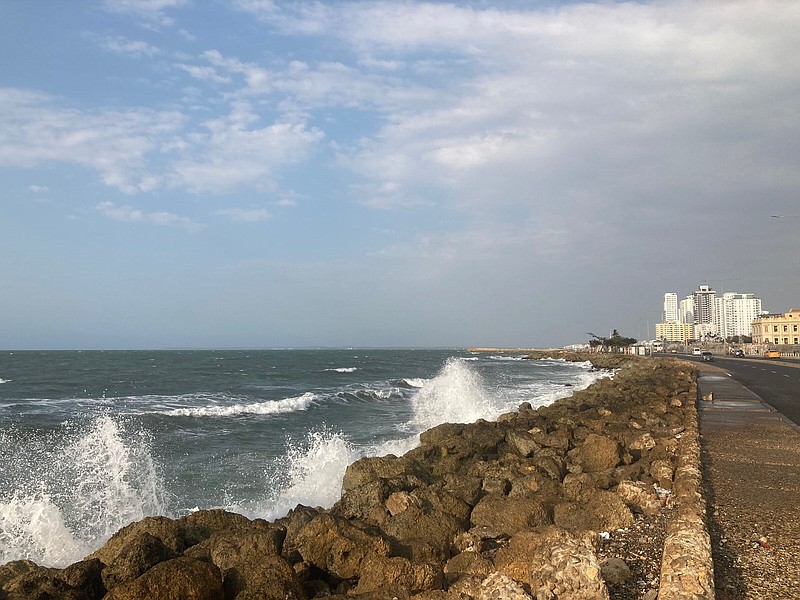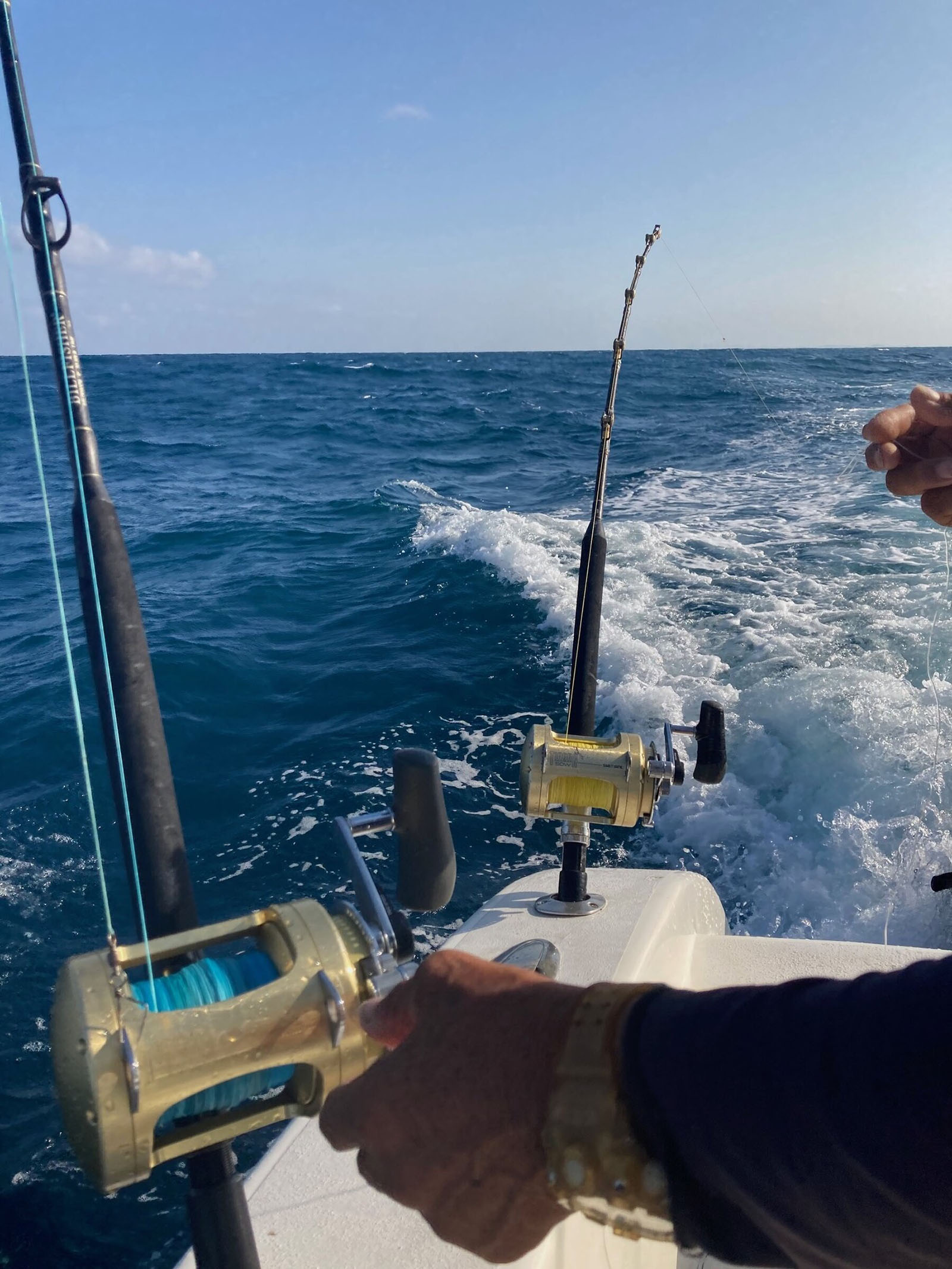Watching a scarlet sunset over Cuba is one of the coolest things I have seen.
It was an unexpected bonus on the last leg of an all-day flight from Little Rock to Cartagena, Colombia, with my brother Brad, who floated the idea spontaneously several weeks ago over dinner. You know how those things go. They erupt enthusiastically and evaporate just as quickly, so I was highly surprised when a fairly complete itinerary emerged about a week later.
"If you could pick just one place to just up and go ..." was the premise.
I have wanted to fish in South America for a long time. Trout fishing in Patagonia is a lifelong desire, but it seems to lack in some other areas. Costa Rica is Brad's favorite, but he's been there a lot. Same for Brazil. The Colombian coast seemed to have everything we wanted. We could fish for billfish, mahi-mahi and wahoo offshore. We could fish for other species inshore and nearshore. We might even be able to go inland for dorado.
Getting there was fairly easy. The morning of Feb. 10 started with a short flight to Chicago, followed by another flight to Miami. From there, it was only about three hours across the Caribbean to Cartagena. That leg took us over Cuba at sunset. We skirted Cuba, actually, but we saw it clearly from low altitude. It was sparsely populated, with only a few dim lights burning in a few fishing villages.
Cuba's history is so intertwined with United States history, and yet it is so mysterious. A mass exodus from Cuba in 1980 affected a gubernatorial election in Arkansas and influenced American pop culture. The film "Scarface," starring Al Pacino, comes immediately to mind.
On Oct. 27, 1962, Vasily Aleksandrovich Arkhipov, an officer on the Soviet submarine B-59, refused to allow the captain to fire a nuclear-tipped torpedo at the U.S.S. Randolph, an American aircraft carrier. That incident was at the height of the Cuban Missile Crisis, almost exactly one year before I was born, and it probably would have touched off a worldwide nuclear war. "Blind Man's Bluff: The Untold Story of American Submarine Espionage," by Annette Lawrence Drew, Christopher Drew and Sherry Sontag, describes the incident in full detail.
For my lifetime, Cuba is an anathema to the U.S. It's the enemy, an existential threat. And suddenly, shimmering in a stunningly sunset, there it was. I couldn't avert my eyes from it.
Coastal fishing in Cuba is phenomenal, but that is perhaps for another day. We had great expectations for fishing in Colombia. Regrettably, it did not materialize for several reasons. An outfitter took us about 9-12 miles offshore, but the sea was very rough, with deep, steep swells. We dropped into a few troughs that were so high that we could only see vertical water on both sides. Then we'd popped out over the top and dropped into the next swell. Our outfitter offered to take us again free of charge when the sea calmed, but it never did. The wind blew about 20 mph the whole time we were there.
Brad hired a driver to take us around town, a wise move. You can get around Cartagena easily in taxis, but it's a lot simpler to have somebody on call. The price is established, so there are no surprise fares.
There are other surprises, though. Riding in a vehicle on the streets of Cartagena was one of the most thrilling, most harrowing experiences of my life. If there are two lanes going one direction, there are always three lanes of vehicles squeezed in. Motorcyclists and scooter riders descend into any opening like flocks of blackbirds. They light, but as soon as traffic starts moving, they vanish in a blink. Once I saw a line of motorcyclists between a semi-tractor rig and a bus. Their shoulders touched both vehicles.
Everybody honks, but it's not angry honking like occurs in the U.S. It's communication. "I'm coming over!" Or, "I'm turning out!" It's not negotiable. If somebody signals they're coming in or going out, they are going to do it.
One of my greatest regrets from this trip was not videoing our ride across town on our first Friday night. Brad and I agreed that there is not a driver in Arkansas that would last five minutes in that scrum.
Another thing we learned is that no matter where you want to go or what you want to see, your driver or host always wants to take you somewhere else, always to a competing establishment that his relative owns. To refuse causes tension, so it's prudent to go along with it. Usually it works out, but not always.
Our driver, for example, was mystified as to why we wanted to fish offshore. He has a relative that would take us fishing nearshore. Questioning in my broken Spanish revealed that the relative had some kind of rickety wooden boat. We would have to rent tackle. It all sounded very sketchy. We declined, much to our driver's disappointment.
A boat ride to the ocean through Cartagena Bay is a clash of cultures. Local fishermen in canoes fish with hand lines as they ride the waves of giant merchantmen and cruise ships. They are not seagoing canoes, but aluminum canoes like we use in Arkansas. I was astonished to see people in canoes fishing with hand lines while anchored off the seaward side of the barrier islands.
We stayed in an old part of town called the Walled City within the confines of the original Spanish fort. It is considered to be a safe area, but street vendors and hustlers of all descriptions are ubiquitous. An example was a quartet of rappers that surrounded me and rapped loudly in my face for almost two blocks. They will disperse if you give them money, but if you do, a mob will descend on you like mosquitoes.
A guy from New York said something very discreetly to the hustlers that made them disperse. I asked him for the magic words.
"Muy amable," he said. "It means, 'Very kind.' It's a polite local way of saying, 'No thank you.'
"If that doesn't work, you say, 'Dios le bendiga.' God bless you!" They know you're not buying.
All in all, our do-it-yourself approach fell well short of our expectations. I would go through an adventure outfitter like Trek Safaris in the future.
On the other hand, seeing Cuba in the sunset was worth the cost.


